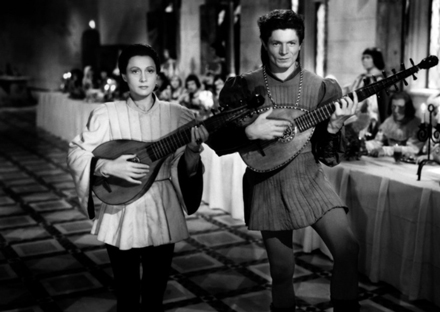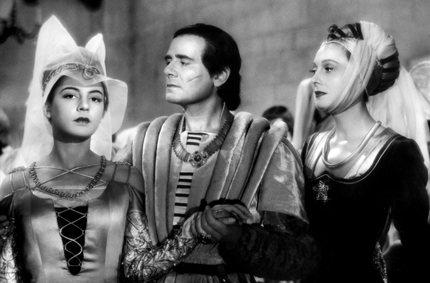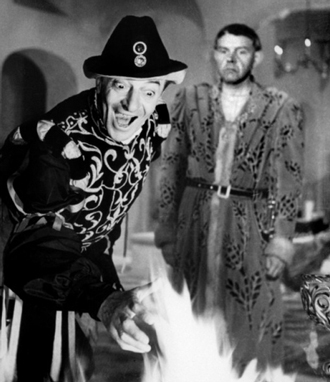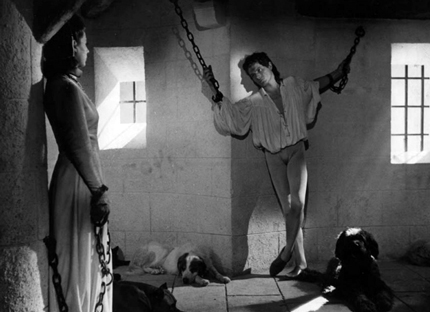
 |
|
|
|
The most enduring and internationally best-known film by the French creative team of Marcel Carné and Jacques Prévert is 1945's Children of Paradise, filmed mostly during the last months of the German Occupation. But the biggest hit of Carné and Prévert's wartime films is Les Visiteurs du Soir from earlier in the Occupation years. An alternately dark and hopeful romantic fairy tale, the picture was produced under the controlling eyes of the German censors. Yet it was embraced by the captive French population as an expression of France's unconquerable spirit. 
The fantastic story is set at a sunny castle in the 15th century. The melancholy Baron Hugues (Fernand Ledoux) is celebrating an upcoming wedding but remains in mourning for his wife, who died many years before. The Baron's beautiful and innocent daughter Anne (Mary Déa) has resigned herself to be a good spouse for the bold but domineering Baron Renaud (Marcel Herrand), her intended. But a pair of minstrels arrives at the castle and soon reveal themselves to nobles traveling incognito. The beautiful Dominique (Arletty) is disguised as a man, so the handsome Gilles (Alain Cuny) makes the introductions. As it turns out, they are actually The Devil's Envoys (the film's English title), who roam the Earth interfering with affairs of the heart to spread misery and despair. Dominique's music freezes the entire court during a dance, allowing the interlopers to separate and seduce the engaged couple. As the days pass Dominique also wraps the vulnerable Baron Hugues around her finger, but Gilles' plans go amiss: Anne's heart is so pure that he forgets his diabolical mission and falls in love. The moment Gilles declares himself, a bolt of lightning announces the arrival of The Devil (Jules Berry). Greeted as another noble traveler, The Devil joins with Dominique to spur a deadly jealousy between Baron Hugues and Renaud. Despite his master's warnings, Gilles refuses to deny Anne. Her purity fascinates The Devil, and when she rejects his proffered affection, a terrible price will have to be paid. An almost perfect fairy tale fantasy of romance and doom, Les Visiteurs du Soir engages on an adult level. We're given a fairly generic setup, with the unhappy Baron, his pure-of-heart daughter and the brutish groom-to-be. This Barony suffers from a lack of male leadership, with the weak Hugues and the arrogant, possessive Renaud hardly qualifying as great role models. The envoys Dominique and Gilles were once lovers but have since sold their souls to The Devil. They are irresistible but also fallible. A cruel seducer, Dominique easily captivates both Hugues and Renaud with her lazy eyes and calculated smiles. As incarnated by Arletty, one of the biggest stars of the French Occupation, Dominique is utterly heartless. At one point she maneuvers Renaud into dueling without his protective chain mail, to 'prove' his love. In a scene cut from the movie but described by a film critic, Dominique is last seen laughing as a man throws himself off a precipice. 
Jules Berry is one of the better Devils ever to grace a screen: jolly, well mannered and delighted by his power to plague humans with ruin and tragedy. Introduced in a bolt of lightning, he loves the way the fire caresses his fingers. At one point The Devil induces the entire court to laugh, just because he is laughing; he then turns furious and demands to know what they are laughing about, almost identically to Joe Pesci in Martin Scorsese's Goodfellas. The Devil easily undermines the self-confidence of those around him, but he has difficulties with Anne. Once she has fallen in love with Gilles, Anne is impervious to The Devil's veiled threats. To some extent she can even resist his magic. Marie Déa is a superb princess figure, confident in her feelings. When The Devil tries to shame her for having sexual relations with a man not her fiancé, Anne is not troubled. She followed her heart to her true love, and where is the shame in that? There's a lesson here for anyone who seeks to judge another's love life... Les Visiteurs du Soir has a much slower pace than Cocteau's comparable Beauty and the Beast and fewer instances of visual magic. Its setting is also far more realistic. The only odd note occurs when the curvaceous Arletty is accepted as Gilles' brother at court. Excepting the infernal intruders, the rest of the cast is human, even a trio of misshapen dwarves that frolic and sing of calamity to come. As if influenced by Gilles, one of them prepares the bed in the bridal bower, providing the 'signal' that Gilles and Anne consummate their Love At First Sight. Alain Cuny's performance inLes Visiteurs easily tops that of Jean Marais in Beauty and the Beast. Cuny is suitably ruthless when seducing the unguarded Anne. When his own ability to love is reborn, we can see the transformation in his eyes. 
Just as in 'original edition' fairy tales Les Visiteurs is a grim collection of human cruelties, capped only by a tentative victory for true love. Anne and Gilles are at one point chained to opposing dungeon walls, and Anne is forced to make a terrible bargain to save the disobedient Gilles from who-knows-what punishment The Devil has prepared for him. The Devil cannot be defeated, but Anne proves that her love can win a victory, of sorts. 1 Truly a fairy tale for compromised times, Les Visiteurs du Soir was the most popular film of its year in France, when the Germans permitted only Axis-sourced entertainments on French screens. Already famous for a number of big hits, Marcel Carné and Jacques Prévert were half wooed, half tricked into working for a collaborationist film studio, along with notables like Maurice Tourneur and Henri-Georges Clouzot. As explained in the disc insert essay, working in entertainment during the Occupation was risky: not only could one be shot by the Germans, one's own countrymen might later take harsh reprisals. Almost nobody working could claim political neutrality. Big stars, including Arletty, socialized with the occupiers in fancy Parisian restaurants, while the average Frenchman was having trouble avoiding malnutrition. Arletty's influence aided the production in getting passes between the free and occupied zones, and securing the use of cavalry horses. As it was, at least two of the film's main contributors were Jews in hiding and had to work under assumed names, including the great designer Alexandre Trauner. 
We're told that French audiences were quick to interpret Les Visiteurs du Soir as a political parable, even though the filmmakers hadn't designed the film to that end. The Devil was immediately recognized as Hitler, and the magical miracle that finishes the movie (no spoilers) was taken as a sign that the French spirit will endure no matter what. The Criterion Collection's Blu-ray of Les Visiteurs du Soir is a very pleasing B&W encoding with picture and audio much improved over old 16mm prints, where the soundtrack in particular was a disaster. We can finally enjoy Maurice Thieret's magical music score. Hopefully this release will spur interest in this seldom screened winner. Disc producer Elizabeth Pauker (a new name?) does not produce a wide range of extras but the 37-minute 2009 making-of docu L'aventure de "Visiteurs du Soir" gives us an in-depth picture of the production and its historical context. Film critics and an assistant to one of the filmmakers explain how the show came to be and describe the unusual on-set situation, where the food for the feast scenes had to be sprayed with poison to keep the extras from eating it all between takes -- "everybody was starving." We're also told that both Simone Signoret and Alain Resnais played extras in the banquet scenes. An original trailer from the occupation heralds Les Visiteurs as the best French film of the year. Critic Michael Atkinson provides more detail and opinions in his insert booklet essay. The booklet and the keep case appear to be decorated with original Alexandre Trauner artwork.
On a scale of Excellent, Good, Fair, and Poor,
Les Visiteurs du Soir Blu-ray rates:
Footnote:
1. Although George Abbott's Damn Yankees is obviously sourced from Faust, it seems influenced by Les Visiteurs du Soir as well. The Devil has difficulties with his undead assistants Gilles and Dominique, who work as a team breaking hearts and driving lovers to their deaths. The Devil's final frustration, fading out in mid-tantrum, is also very much like the exit of Damn Yankees' Mr. Applegate.
Reviews on the Savant main site have additional credits information and are often updated and annotated with reader input and graphics. Also, don't forget the 2011 Savant Wish List. T'was Ever Thus.
Review Staff | About DVD Talk | Newsletter Subscribe | Join DVD Talk Forum |
| ||||||||||||||||||